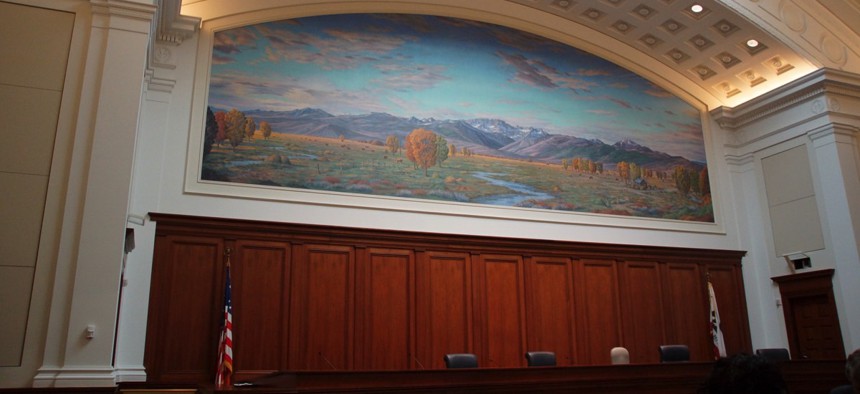Appeals Court Ruling on ‘California Rule’ for Pensions; Colo. Cops Busted Over ‘Pokémon Go’ Pursuit

Supreme Court of California chamber trophygeek / Flickr.com

Connecting state and local government leaders
Also in our State & Local Daily Digest: Alaska’s law on moose roadkill theft; transparency fight in Pittsburgh; space balloon project in Ariz. county prompts questions over gift ban violation.
SACRAMENTO, CALIFORNIA
PENSIONS | The “California rule,” a series of court decisions that seem to prevent any changes in pension benefits for the state’s public employees once they are granted has often been cited by unions as a way of resisting efforts to overhaul the costly programs. Last week, an appellate court ruled that the California rule is not an absolute barrier to making changes to existing pensions. If the ruling is upheld, it may allow for some significant changes to state and local benefits. [The Sacramento Bee]
COMMERCE CITY, COLORADO
LAW ENFORCEMENT | Two cops in this Denver suburb, who were overseeing the training of new officers, got into hot water when they were found to be leading recruits on “Pokémon Go” adventures, instead of working through the prescribed training curriculum. The popular mobile app-based game involves tracking down virtual characters that appear in real world surroundings on the screens of cellphones and other devices. “When supervisors discovered this performance issue, it was immediately addressed; the officers’ training duties were removed and these duties have yet to be restored,” a city spokesperson said. [The Denver Post]
PITTSBURGH, PENNSYLVANIA
TRANSPARENCY | The city is fighting OpenPittsburgh.org’s push to amend the municipal charter and require more information and meetings be put on line, as well as a citizens advisory committee be established, in court. A referendum will appear on the November ballot, but the city wants it removed arguing it’s imposing unfunded mandates and invalidating the charter itself. “The Peduto administration is committed to open and transparent government, and we appreciate the spirit of the proposed referendum,” said Kevin Acklin, the mayor's chief of staff. “However, the proposal completely undermines the basic structure of city government, is illegally vague and misleading, and violates state law and the terms of the federal court order.” [The Tribune-Review]
DEWITT, NEW YORK
ECONOMIC DEVELOPMENT | A high-tech film studio built here with $15 million of state funds has yet to yield the economic development benefits state leaders had predicted. Gov. Andrew Cuomo had initially touted the studio as a way to create at least 350 jobs in Dewitt, a town in central New York, located east of Syracuse. But while construction of the film hub was completed last year, the facility remains more-or-less vacant with just two full-time employees. Meanwhile, executives with the company that is the studio’s anchor tenant have been entangled in legal troubles. Cuomo administration officials argue that the governor’s job promises were expected to come to fruition over seven-years. [The New York Times]
PIMA COUNTY, ARIZONA
SPACE BALLOONS | The county Board of Supervisors is being sued for violating a gift clause, having approved construction of a $15 million manufacturing center, headquarters and space balloon launch pad on behalf of World View. The company makes helium-filled balloons for space tourism and research, and officials argue it will pay the money back over the course of a 20-year lease. Opponents said the deal was also unfairly awarded. [Arizona Daily Star]
TALKEETNA, ALASKA
WILDLIFE | It’s illegal in Alaska to steal roadkill moose. Once an animal is killed by a car or truck, the body becomes property of the state. Yet, twice in the last 30 days the Alaska Moose Federation—a nonprofit collects these carcasses and delivers the salvaged meat to qualifying state residents—has arrived to collect a dead moose only to find it missing from where it should have been on the side of the highway. Because of the law, "someone could be charged with illegal possession and/or theft. If a person kills the animal with their vehicle and also takes it instead of turning it over to the state,” says Alaska State Troopers spokeswoman Megan Peters. [Alaska Dispatch News]

NEXT STORY: Consumerization, connected devices driving mobility management




